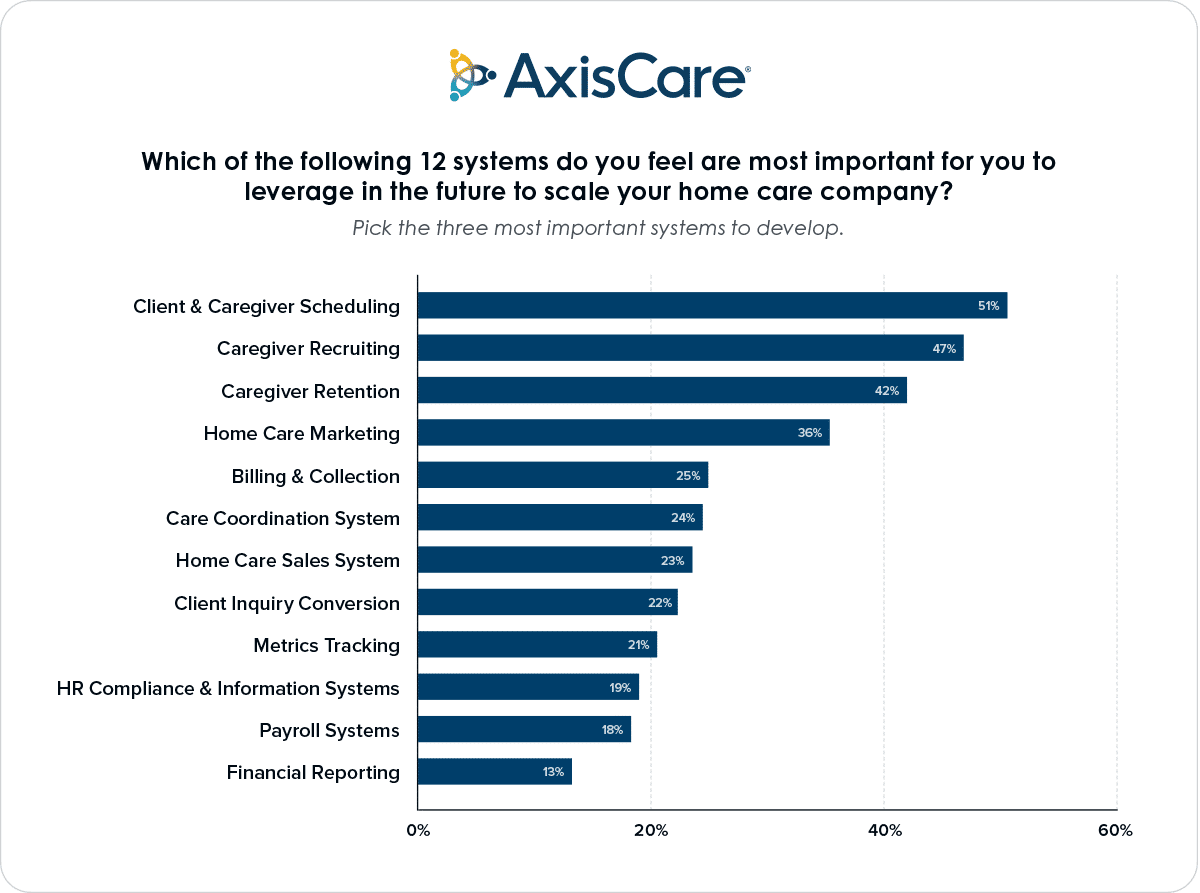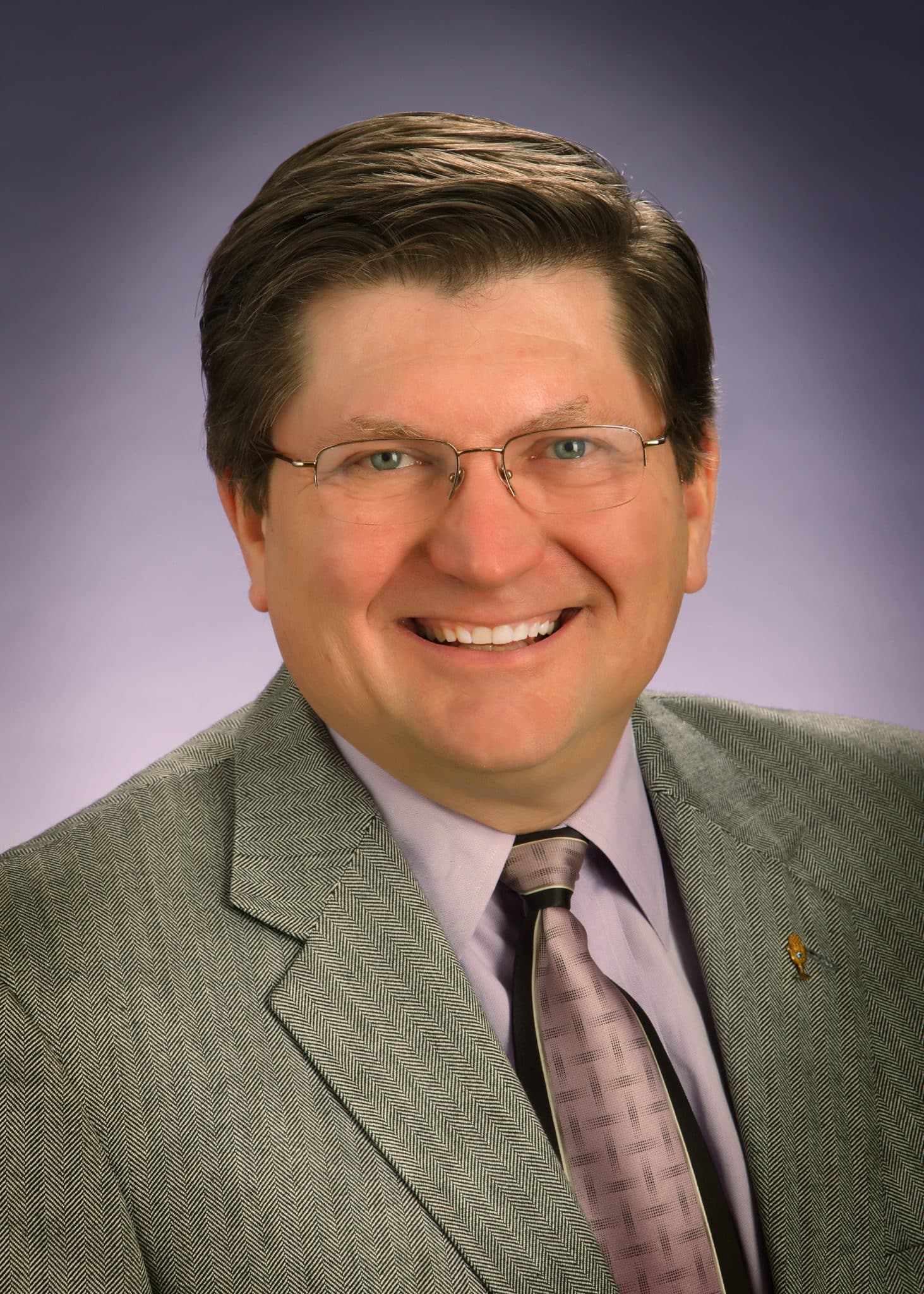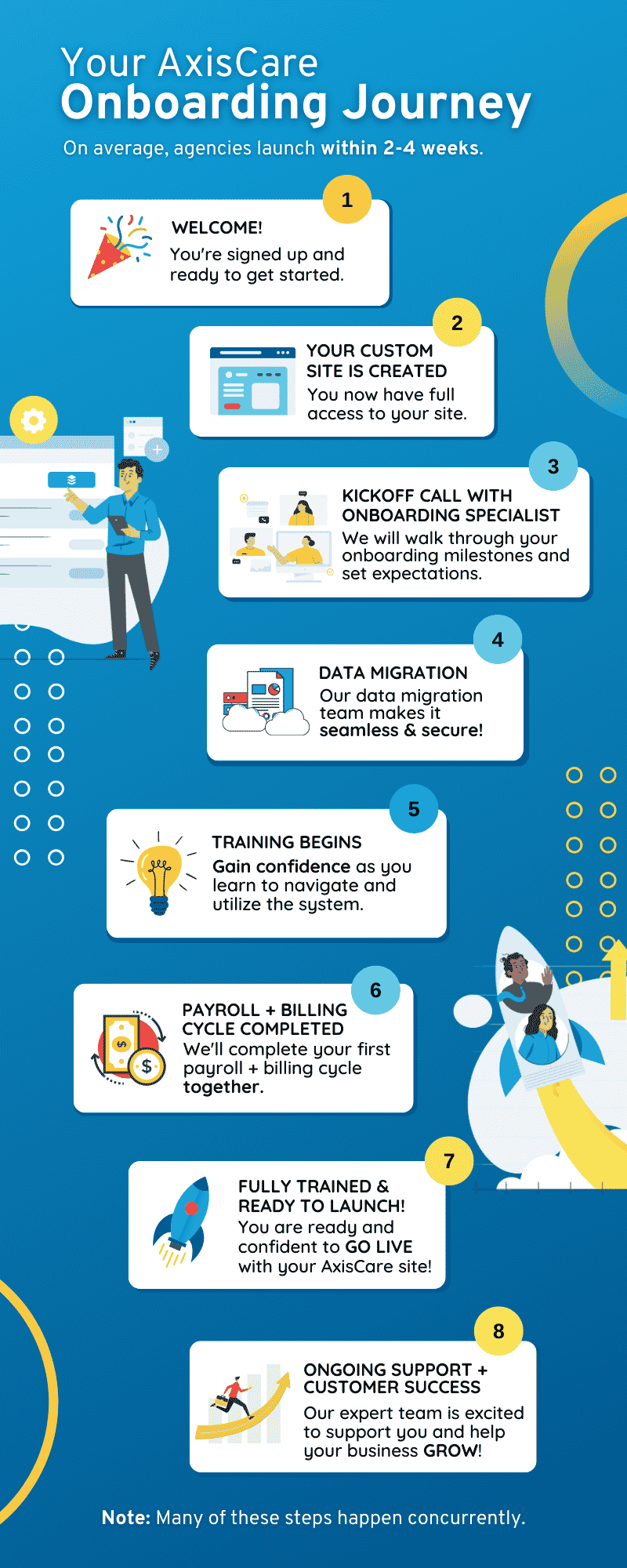A three–part series by Stephen Tweed, CEO of
Leading Home Care … a Tweed Jeffries company
Part I: Identifying the Challenges With Scheduling
According to the 2025 Future of Home Care Study, sponsored by AxisCare and conducted by Leading Home Care … a Tweed Jeffries company, the number one system challenge for Home Care leaders is …. “Client and Caregiver Scheduling.”
The second most important system is Caregiver Recruiting, and the third most important is Caregiver Retention.
Source: 2025 Future of Home Care Study
According to a recent series of interviews with CEOs and former owners of home care companies, the biggest challenge in Home Care operations is Scheduling.
Several weeks ago, Olivia Sheffer, Marketing and Communications Manager at AxisCare reached out to me with a request. Would I write a blog article for AxisCare citing some of my data on Scheduling Coordinator turnover. She had heard me as a guest on an industry podcast, and I had made a comment about one of the biggest problems in Home Care operations being turnover of Scheduling Coordinators. I had to admit to Olivia that I didn’t have any real data on scheduler turnover, but I had a number of anecdotal examples that led me to make that comment. I agreed to write the article, and to do some more research on this question.
What Home Care Thought Leaders Say About Schedulers and Scheduling
To get a clearer picture of the issues of schedulers and scheduling, I conducted a series of interviews with some home care industry thought leaders whom I have met through my work as Founder of the Home Care CEO Forum, and leader of Home Care CEO Mastermind Groups in the Top 5% of the industry.
I started with Sandi McCann, whom I first heard talking about the frustrations of scheduler burnout and turnover. Sandi is the Founder and former owner of Home Care of the Rockies in Longmont, Colorado. Sandi was a member of our Strategic Growth Mastermind Group before she sold her company, moved to Savannah, GA to be near her daughter and granddaughter, and began working with other home care companies to implement the Entrepreneurial Operating System, or EOS.
Sandi told me, “Scheduling is the worst job in home care. You are always thinking about the job, and it’s like being a 911 operator, always reacting to emergencies.” Sandi realized that the biggest source of her own stress as a company owner was dealing with frustration, burnout, and turnover of scheduling coordinators.
Next, I talked with Andy Tysinger and Jim Kimzey, the co-founders of Full Bloom Memory Care in Lake Forest, IL. I first met Andy when he was COO of SeniorCorp in Virginia Beach, VA and a member of our Top 5% Mastermind Group. Jim was the founder and CEO of Tender Rose Dementia Care in San Francisco, CA.
Jim began by telling us, “Scheduler turnover is the hardest thing to deal with. It’s like a canary in a coal mine. It’s a symptom of other issues. Evening and weekend on-call is horrific. You are on your own and chained to your computer.”
Andy followed by saying, “As you grow, you have to constantly revise your systems. What worked for us when we were doing 1,000 hours per week was very different from when we did 7,000 hours per week. When we sold the company, we were doing 15,000 hours per week, and we had systems that improved effectiveness and reduced the stress on schedulers.” One of the things Andy did at SeniorCorp was bring in a full-time talent manager to work with caregivers and be the liaison between the recruiters and the schedulers.
Matt Steltenpohl is the Director of Operations at his family-owned home care company, Solutions In-Home Care in Kennewick, WA. Matt and his company are members of our Top 10% CEO Mastermind Group at the Home Care CEO Forum.
Matt is also the founder of Breeze Ops, a new consulting company that works with home care companies to automate office systems to make their businesses more efficient.
He told us, “We have been blessed to have the same lead scheduler for ten years. She is amazing, and when she turned in her resignation several years ago because her family was moving to Utah, we found a way to have her work remote and stay with us.
“Our business is matching,” said Matt. “We are all about matching clients and caregivers. We are all about figuring out how to match schedules. The clients want the same caregiver for every shift, and the caregivers want a stable schedule and to work with the same client.”
Matt continued by saying, “We really accelerated our business growth when we figured out what we are going to be great at…matching. Our clients and caregivers want permanent and consistent matching.”
Next, I talked with Andrew Huber, co-owner and President of Martha’s Hands Home Care in St. Louis, MO. Andrew and Martha’s Hands are the sole remaining charter members of the Top 5% CEO Mastermind Group at the Home Care CEO Forum. Andrew was the COO for many years in this company founded by his Wife, Denise, and his mother-in-law, Eileen Hedrick, several decades ago. It was a conversation with Andrew that sparked me to introduce the Mastermind Concept to the home care industry in 2013 and start the first Home Care CEO Mastermind Group.
Andrew said, “My worst nightmare was from our very first scheduler when we started the company. At first it was all family members, but when we got big enough, we brought in one of our caregivers who was a CNA to be our scheduler. She was a wonderful person and a great caregiver, but she was overwhelmed by the technology and the constant pressure. One Friday afternoon, I was getting ready to go to Chicago for a family wedding. Our scheduler met me in the parking lot, handed me her keys, and said ‘I Quit!’. I went back into the office and discovered she had deleted the entire schedule from our system. I spent the weekend calling clients and caregivers to try to put our schedule back together.”
Since then, Andrew and his team have recovered, resolved their issues, and have grown into the top 5% of the home care industry. “You have to be clear about your goals,” said Andrew. “We have to do three things; fill all our shifts, create a good match between clients and caregivers, and always do the right thing in the home.” He also told us that the biggest issue is figuring out on-call for evenings and weekends. This is the biggest source of frustration, burnout, and turnover for scheduling coordinators, or “staffing managers” as Martha’s Hands calls them.
My final conversation for this series of articles was with Dina White, the President of Kaden Care in Dunwoody, GA. Dina is the leader of a family business started by her mother, Linda Kaden.
Dina told me, “We’re set up differently. We don’t have schedulers. We have Client Experience Managers (CEM) who coordinate all of the care for our clients and our caregivers. They do their own scheduling. Before we went to this model, we did have issues with turnover. We found that schedulers turned over because they were siloed, didn’t feel like they had support, and felt like a 911 operator.”
“Our new model has the Client Experience Manager who handles about 2,000 hours of care per week, has a specific geographic territory, and who works with 45 to 50 clients. We actually worked with an outside company to develop an assessment tool that measures behavioral styles and cognitive ability to help us select new CEM’s.”
Causes of Scheduler Turnover, and Solutions From Industry Thought Leaders
These interviews helped us get a better understanding of the issues around scheduling, scheduling coordinators, and scheduling systems. We were able to identify the causes of scheduler frustration, burnout, and turnover.
We were also able to pull together a very specific list of what these leaders and companies have done to resolve these big burning issues that affected the growth and success of their businesses.
Stay Tuned for Part II and Part III of the Three-Part Series
These interviews helped us get a better understanding of the issues around scheduling, scheduling coordinators, and scheduling systems. We were able to identify the causes of scheduler frustration, burnout, and turnover.
We were also able to pull together a very specific list of what these leaders and companies have done to resolve these big burning issues that affected the growth and success of their businesses.
Stephen Tweed is a home care industry strategic advisor, researcher, and thought leader. He is the CEO of Leading Home Care … a Tweed Jeffries company based in Louisville, KY, and the Founder of the Home Care CEO Forum, based in Federal Way, WA.











